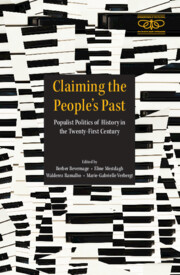Book contents
8 - Historical Consciousness in the Age of Donald Trump: Populism, Evangelicalism, and the Typological Imagination
Published online by Cambridge University Press: 15 May 2024
Summary
Introduction
For admirers and detractors alike, Donald Trump's presidency signified a rupture, whether a revelatory inflection point on the brink of a national calamity or a nightmarish transgression of norms and dereliction of duty. Back in 2015, he was the ‘chaos candidate’. Ever since he amplified and dramatized a sense of crisis with the rhetoric he unleashed to announce threats and denounce enemies, both foreign and domestic, as well as through the venues he chose to engage the public, whether large public rallies or daily cascades of tweets (Moffit 2015). The crisis turned more acute and tangible towards the end of his presidency during the COVID-19 pandemic and the eruption of protests following George Floyd's death. It climaxed with the storming of the Capitol on 6 January 2021, when belligerent language and populist rage turned into political violence.
Conflict, crisis, and the sense that a momentous shift is afoot, that the present in some sense is already historic, prompted an intense, both overt and implicit, engagement with the past in American public life. Allusions to the past proliferated in an effort to justify, condemn, or simply comprehend Trump, his politics, and his demeanour. The past, its memory and pedagogy, the meaning of national symbols, and questions about the mnemonic function of the state fed heated disputes and political skirmishes, especially over race and the legacy of slavery. While history was deployed in a volatile political landscape, invocations of the past – from whatever political camp – also indicated a desire for legibility and predictability, facing perceived threats, endemic insecurities, and a perennial gap between expectations and the reality of American life.
This chapter employs Trump and his tenure in the White House to explore the contours and content of the populist historical imagination in the contemporary United States of America (USA). A populist streak is discernible in American politics dating back to the 1830s. Historically, the term ‘populism’ carried a somewhat different valence in Europe, Latin America, and the USA. However, the current political moment signifies a convergence, exemplified, for instance, by Trump's cult of personality and authoritarianism; both were less pronounced in previous iterations of American populism.
- Type
- Chapter
- Information
- Claiming the People's PastPopulist Politics of History in the Twenty-First Century, pp. 155 - 173Publisher: Cambridge University PressPrint publication year: 2024

